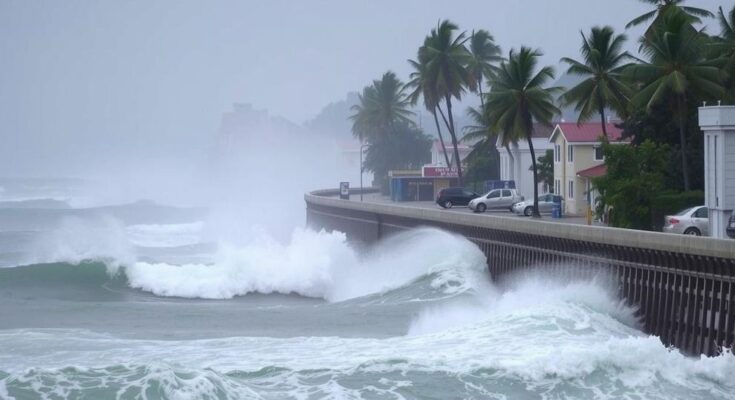Peru and Ecuador are grappling with dangerous coastal waves, estimated at 13 feet high, resulting in flooding, damage to fishing communities, and the closure of numerous seaports. Two fatalities have been reported in Ecuador, with significant rescue operations underway for stranded fishermen. Climate change is cited as a contributing factor to this ongoing phenomenon.
Authorities in Peru and Ecuador are persistently advising residents to steer clear of the coastline as extreme waves, significantly larger than normal, wreak havoc along the shores. This extraordinary event commenced on Christmas Day, intensified on December 27 and 28, and is projected to continue until at least January 4. Reports indicate that waves have surged to heights of 13 feet (4 meters), impacting fishing communities and popular tourist destinations, with significant flooding observed in Callao.
In response to the crisis, the government has closed 100 out of 121 seaports, with the northern regions bearing the brunt of the disaster. Dramatic visuals illustrate fishing vessels being violently tossed by the monstrous waves. The Navy announced a rescue operation on December 28, aiding 30 fishermen trapped at sea, while estimates suggest over 100 additional individuals remain stranded. One community has reported the loss of approximately 100 fishing boats.
The waves have been measured at three times their usual heights, prompting warnings from Navy Captain Enrique Varea about a potential intensification of conditions. Meteorologists anticipate some moderation of the waves by the end of the week; however, impacts are anticipated to persist. Civil Defense officials attribute these circumstances to climate change, citing a combination of powerful winds from the United States and abnormal tide patterns. They have dismissed notions of a tsunami or freak wave, asserting this reflects a sustained weather phenomenon. Moreover, they warned that similar weather events could increase with ongoing global temperature rises.
Peru had already declared an environmental emergency the previous week due to an oil spill affecting approximately 10,000 square meters of ocean and damaging multiple beaches and local fauna. The holiday season typically sees a surge in coastal tourism, but businesses have suffered extensive flood damage. Tragically, Ecuador has reported two fatalities linked to the waves, and Chile has confirmed a body found on its beaches, though Peru has yet to verify any deaths related to this event.
The recent high wave phenomenon impacting the coastlines of Peru and Ecuador has caused widespread concern among government officials and residents alike. Such extreme weather events can be attributed to climate change, leading to elevated sea levels and intensified storm systems. Understanding the environmental implications of climate change and recognizing the need for preparedness in coastal areas is crucial, as these severe conditions could pose ongoing risks in the future. Additionally, the recent oil spill further complicates the environmental response and highlights the fragility of marine ecosystems in the region, necessitating a thorough evaluation of the situation.
In summary, the extraordinary wave events along the coasts of Peru and Ecuador have led to significant disruptions, including widespread property damage, the loss of boats, and tragic fatalities. Government officials are emphasizing the need for public safety by prohibiting coastal access. The incident underscores the pressing realities of climate change and its role in exacerbating severe weather conditions. Continued vigilance and preparedness are essential for mitigating the risks presented by such natural disasters in the future.
Original Source: www.maritime-executive.com




